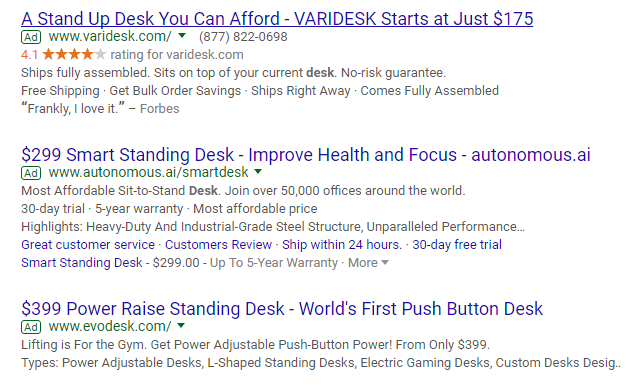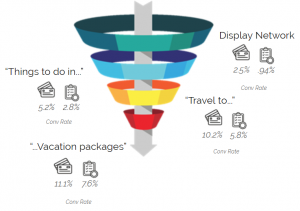As PPC advertisers, it’s easy to get lost in the numbers. Budget and bid adjustments, swings in click-through rate, lost impression share; these metrics fundamentally guide our strategy. Would we even be able to effectively perform our jobs without the near-limitless data Google provides?
But at the heart of it all is the ad itself: the one opportunity we have as advertisers to inject a little flair. A space where we’re able to communicate directly with our prospective customers.
Yet, so many ads waste those precious characters to discuss mindless drivel. Too often do we forget that there’s another person on the other side of the screen with emotions and insights that can’t be determined by statistics. Ad copy isn’t solely a numbers game, it takes a little more effort.
So today, I want to give you three actionable items to beef up your copy and stand apart from your competition on the search results page.
I’m not talking about best practices, you can read those here (link to page).
Add Quantifiable Statistics
I lied, numbers do matter in ad copy to an extent.
What description sounds more legitimate?
- The Best Epoxy on the Market. We’re the Epoxy Experts!
- Used by Over 50,000 Satisfied Customers. We’re the Epoxy Experts!
Metrics, in this case, matter a great deal to a customer. Any advertiser can claim to be “the best” or “the expert” in the ad copy, so why would anyone trust this? The first example gives no real value to anyone in the search results page and is just a wasted impression.
The second version gives much more assurance to the user by using “50,000 satisfied customers.” It gives the reader a unit by which to measure the product and further instills a sense a value. Even better, you can back up the claim on the landing page with things like customer testimonials. The second copy achieves so much more in the space provided by simply making statistics the focal point. Ever hear the phrase “Over One Billion Served?”
So, if your product or service has something quantifiable that can benefit the copy, use it!
Can you ship an item in under five days? Will your product improve someone’s efficiency by 50%? These are questions you should be asking yourself and telling people in your copy!
Address Questions in the Headline
We Google things to find answers to questions.Even if it’s a three-word query, we’re looking for a piece of information in some form or another. The entire basis of the search engine is to find the most relevant topic for your search, which is why quality score exists. Google should be thought of as an endless Q&A session between you and the search results page.
Even if it’s a three-word query, we’re looking for a piece of information in some form or another. The entire basis of search engines is to find the most relevant topic for your search, which is why quality scores for ads exists. Google should be thought of as an endless Q&A session between you and the search results page.
So if this is the case, why not use that to your advantage?
Tapping into the reason behind a user’s search is how you garner an interaction, rather than just a click. Your keywords should be organized into ad groups that are speaking to a central theme. Take this one step further and really ask yourself what the person is looking for in the results page. From there, you can pose a question to the user.
Consider these examples:
- “Copper kitchen countertop” becomes “Remodeling Your Home?”
- “Refinance auto loan” turns into “Need Help Making Your Car Payments?”
- “Sand wedge” is “Stop Living in the Bunker”
How can you apply this to your industry?
Develop an Emotional Connection
In an industry flooded with competition and insane CPCs, a limited budget can only get you so far. The only way you can stand out on the search results page is with unique ad copy.
If everyone in higher positions is claiming to have the lowest prices or offering a percentage off MSRP, use that as an opportunity to infuse some character! We make decisions based on emotions, so leverage that with an emotionally-charged message.

In this example, the BBQ Guys Grills really drive home their point in the description. A user looking for a grill might see this and realize they actually have been replacing a grill every two years, leading to an easy sale for the BBQ Guys who focus on the longevity of their product.

I love VARIDESK’s usage of the H1 to build the relationship with their target customer. Unlike their competition, who is advertising higher prices in this space, VARIDESK utilizes an emotional appeal of affordability. They’re not just saying “Our Desk is Cheaper,” they’re saying YOU can afford it. The price in the H2 only backs that up.
Conclusion
If you’re seeing sluggish click-through rates or low quality scores, perhaps it’s time to refresh your account’s ad copy with one of the aforementioned strategies.
Happy writing!




















